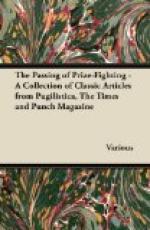The Telephone. Rr-rr-rr-rr.
The Marshal. To h-ll with the telephone! Who is it now? What—an editor of a newspaper? That’s a little bit too thick. What is it you want? To thank God for that masterpiece of bold cunning, the Hindenburg line? Is that what you want? Well, make haste, for the masterpiece doesn’t exist. No, I’m not joking. I can’t joke. Enough (rings off).
* * * * *
[Illustration: Nervous Recruit (on guard for the first time). “HALT, FRIEND! WHO GOES THERE?”]
* * * * *
=THE HOUSE-MASTER.=
Four years I spent beneath his rule,
For three of which askance
I scanned him,
And only after leaving school
Came thoroughly to understand
him;
For he was brusque in various ways
That jarred upon the modern
mother,
And scouted as a silly craze
The theory of the “elder
brother.”
Renowned at Cambridge as an oar
And quite distinguished as
a wrangler,
He felt incomparably more
Pride in his exploits as an
angler;
He held his fishing on the Test
Above the riches of the Speyers,
And there he lured me, as his guest,
Into the ranks of the “dry-flyers.”
He made no fetish of the cane
As owning any special virtue,
But held the discipline of pain,
When rightly earned, would
never hurt you;
With lapses of the normal brand
I think he dealt most mercifully,
But chastened with a heavy hand
The sneak, the liar and the
bully.
We used to criticise his boots,
His simple tastes in food
and fiction,
His everlasting homespun suits,
His leisurely old-fashioned
diction;
And yet we had the saving nous
To recognise no worse disaster
Could possibly befall the House
Than the removal of its Master.
For though his voice was deep and gruff,
And rumbled like a motor-lorry,
He showed the true angelic stuff
If any one was sick or sorry;
So when pneumonia, doubly dread,
Of breath had nearly quite
bereft me,
He watched three nights beside my bed
Until the burning fever left
me.




